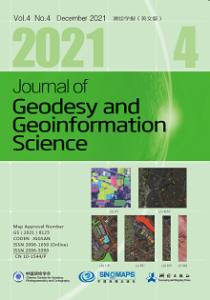 We are inviting papers for a Special Issue with the Journal of Geodesy and Geoinformation Science, September, 2022 on Cartography and Geospatial Information Education: Theories and Practices.
We are inviting papers for a Special Issue with the Journal of Geodesy and Geoinformation Science, September, 2022 on Cartography and Geospatial Information Education: Theories and Practices.
Background
With development of geospatial information science and technology and applications in numerous areas, cartography and geospatial information education becomes increasingly more important in training graduates equipped with new capacities. The contents have always gradually been changing, as well as corresponding effective approaches to deliver sustainable and resilient education. COVID-19 has caused an unprecedented impact on every aspect of society since December of 2019. According to UNESCO monitoring, more than one billion students have experienced school closure [1]. With the help of rapidly improving online meeting tools, some institutions have set teaching and learning onto digital platforms, though some may choose other ways to continue sharing knowledge. Shifting from typical classroom lecturing and face-to-face meeting to online and hybrid learning poses challenges, but it also offers opportunities for education. Cartography and geospatial information education is no exception.
The ICA Commission on Education and Training organized an online workshop “Challenges and Opportunities of Cartography and GIS Education: in the Classroom and in the Cloud” on October 28, 2021. Fourteen speakers presented their research and reflections on education and cartographic theory. And two prestigious educators shared their professional experiences and suggestions with young participants. The workshop received registrations from over thirty countries. In addition, there has been increasing numbers of submissions on education theme during previous International Cartographic Conferences.
To further offer more space for knowledge sharing, this issue invites educators and researchers to contribute research and studies on cartography and geospatial information education and other related topics. Suggested topics of interest can include, but are not limited to, the following:
- Theories of cartography and theoretical foundations for teaching and learning of cartography,
- Spatial thinking, spatial understanding and cognition of cartographic education,
- New paradigms of geospatial information teaching and fieldworks in a social transforming era,
- Development of a ‘Body of Knowledge’ for cartography and course design,
- Sustainable and resilient curriculum and course design for cartography and GIS education,
- Developing online educational resources and open textbooks for cartography and GIS,
- Experiences in online cartography and GIS teaching at various levels,
- Technical support, including open source software and datasets, for academic education in cartography and geospatial information,
- Linking cartographic education with education in other geo-related disciplines
You are warmly invited to consider to submit your paper before Jun 1, 2022 to this special issue. Please leave a message during your submission that “this paper is submitted to the special issue on Cartography and Geospatial Information Education: Theories and Practices”. After review, the tentative publishing date is September, 2022. Please find submission information and author guide lines at: http://jggs.sinomaps.com/
For more information and contact details, please visit the commission website.
Guest editors
Guest editors of the special issue are:
- Tao Wang, Capital Normal University, Beijing, CHINA
- David Fairbairn, Newcastle University, Newcastle Upon Tyne, UK
- Georg Gartner, Vienna University of Technology, Vienna, AUSTRIA
- Xiaojuan Li, Capital Normal University, Beijing, CHINA
- Terje Midtbø, Norwegian University of Science and Technology, Trondheim, NORWAY
- László Zentai, Eötvös Loránd University, Budapest, HUNGARY



